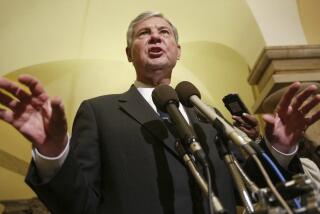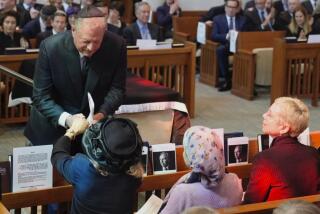PASSINGS
Donald G. Jones
Mentor to a young Hillary Rodham
Donald G. Jones, 78, a professor at Drew University in Madison, N.J., and Methodist minister who was an early spiritual mentor to Hillary Rodham Clinton, died Thursday of natural causes in Morristown, N.J.
Jones was serving his first pastorate at First United Methodist Church in Park Ridge, Ill., when he met a young Hillary Rodham, then a high school freshman. She belonged to the youth group that Jones led.
Colleagues said Jones raised the social awareness of his students, taking them to hear the Rev. Martin Luther King Jr. preaching in Chicago in 1962. Some members of the church disagreed with his direction of the youths, and he resigned after two years.
Clinton, in her memoir “Living History,” credits Jones as an important influence in her life. “Don taught me the meaning of the words ‘faith in action’ and the importance of social justice and human rights,” the Secretary of State and former first lady said in a statement. “I will miss him and will be grateful forever for the gift of his intelligence, counsel, kindness and support over many years.”
Jones served in the Navy and then attended Augustana College in South Dakota, graduating in 1957. Four years later he was ordained as a minister through Drew’s theological school.
After leaving his minister’s post, he returned to Drew to teach and earn his doctorate. He taught social ethics for 36 years at the Madison, N.J., university.
Michael V. O’Hare
Aide’s tip led to U.S. senator’s censure
Michael V. O’Hare, 73, an aide to U.S. Sen. Thomas J. Dodd of Connecticut whose accusations of financial impropriety against his boss led the Senate to censure Dodd in 1967, died March 15 at the University of North Carolina Hospitals in Chapel Hill of complications from a stroke.
O’Hare, who began working for Dodd in 1961, was one of four staffers who copied more than 4,000 documents from Dodd’s files and provided them to syndicated columnists Jack Anderson and Drew Pearson.
The files purportedly showed that Dodd, a Democrat, was doing political favors for a registered foreign agent and that he double-billed seven airline tickets and used $116,083 in political donations to pay personal expenses, including back taxes.
The accusations immediately caused a media firestorm. It was the first case to go before the newly created Senate Ethics Committee, and Dodd was the first U.S. senator to be censured for personal financial misconduct.
Michael Vincent O’Hare was born Jan. 25, 1936, in Jersey City, N.J., and served in the Marine Corps from 1953 to 1956. After being discharged, he enrolled at Catholic University. He put himself through college working for Dodd and holding several other jobs.
Dodd held his Senate seat until 1970, when he lost a reelection bid. He died in 1971.
Walter Schneir
Writer surveyed Rosenberg spy case
Walter Schneir, 81, whose 1965 book “Invitation to an Inquest” on the Rosenberg spy case firmly proclaimed their innocence, died April 11 of thyroid cancer at his home in Pleasantville, N.Y., the New York Times reported.
Written with his wife Miriam, the book reignited the debate over whether Julius Rosenberg and his wife Ethel committed espionage by giving U.S. nuclear secrets to the Soviet Union.
The Rosenbergs were convicted of conspiracy to commit espionage in March 1951 and executed June 19, 1953.
The Schneirs’ book presented evidence that key witnesses had changed their testimony after being prodded by federal prosecutors. The book also alleged that key evidence was forged by the FBI.
However, Schneir changed his view of the Rosenberg case in 1995 when the federal government began to release 3,000 Soviet intelligence documents that pertained to the case.
After reviewing the material, Schneir and his wife wrote in The Nation magazine that “no reasonable person” could doubt Julius Rosenberg’s role as a Soviet spy.
Schneir was born in Brooklyn, N.Y., on Dec. 14, 1927, and graduated from Syracuse University with a journalism degree.
He worked for many years as news editor of MD magazine and later worked as freelance writer. At the time of his death, he was working on a memoir that offered a new narrative of the Rosenberg case, the Times reported.
-- times staff and wire reports news.obits@latimes.com
More to Read
Start your day right
Sign up for Essential California for the L.A. Times biggest news, features and recommendations in your inbox six days a week.
You may occasionally receive promotional content from the Los Angeles Times.






